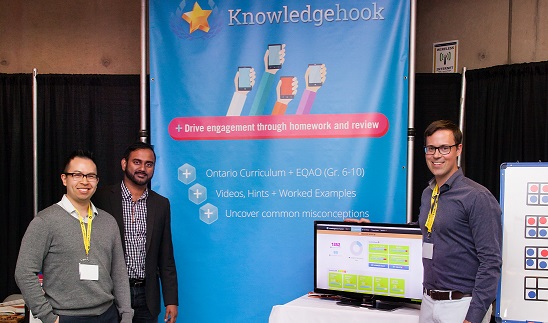Knowledgehook, whose software helps teachers to tailor their support of individual students, has secured $1.25 million in financing to fund the platform’s expansion into global markets.
The Waterloo-based company has developed software that analyzes the academic performance of math students in real-time games to recommend to educators alternative teaching practices. Knowledgehook, which has worked with the Accelerator Centre and Communitech’s Rev accelerator, was founded in 2014 by Ratnam, Francis, Lambo Jayapalan, and Arthur Lui.
Knowledgehook, which this year was named BNN’s Top Disruptor, plans to expand into new markets, such as the United Kingdom and Australia.
The round was led by Sayan Navaratnam, the CEO of Richmond Hill, Ont.-based Connex Telecommunications and head of the investment firm Aadya Capital. The funding team also includes investors Steve Case, co-founder of AOL, and John Abele, co-founder of Boston Scientific. “Knowledgehook has a novel solution to a global problem,” Navaratnam said in a statement. “I believe this technology will be defining for the edtech space, paving the way for how a data-driven approach to teaching can help kids all over the world do better in math.”
Research suggests that throughout Canada and the U.S., student’s math skills are lagging. Knowledgehook’s software identifies what concepts they’re struggling with and why and suggests how teachers can support them. The company’s platform is popular among teachers in more than 75% of Ontario school boards and in more than 300 school districts in the U.S.
In 2016, Knowledgehook software made more than 6,000 recommendations on how teachers could close gaps in their students’ learning.
Last May, Steve Case was one of three Google Demo Day judges to present the company with the annual, audience-selected Google’s Game Changer Award.
“Knowledgehook is a great example of what’s happening in Waterloo,” Case told Demo Day presenters. “The whole edtech space is focused on some real problems. Personalized, adaptive learning systems are clearly important for the next generation of learners.”










